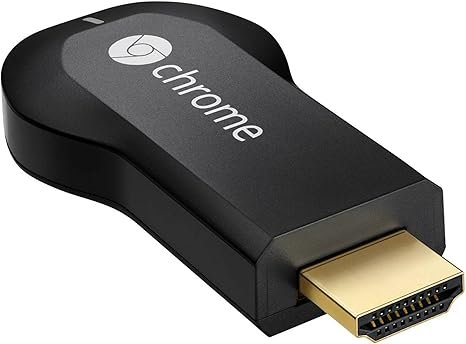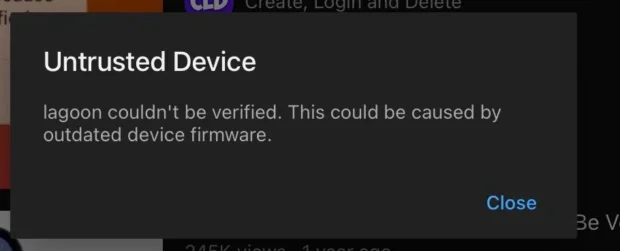
- arrow_back Home
- keyboard_arrow_right Tech & Gadgets
Chromecast (2nd Gen) and Audio Cannot Cast in ‘Untrusted’ Outage: A Detailed Examination
Tech & Gadgets 20 AK March 10, 2025

On March 9, 2025, a significant issue disrupted the experience of countless Chromecast users worldwide. Owners of the Chromecast (2nd generation) and Chromecast Audio devices reported an inability to cast audio or video content, a problem attributed to an “Untrusted” outage. This unexpected glitch has left users frustrated and searching for answers, while Google scrambles to address the situation. In this article, we’ll dive deep into the outage, exploring its causes, implications, and the broader context of Chromecast’s evolution, drawing from the initial report by 9to5Google and supplementing it with technical insights and user sentiment.
Table of Contents
ToggleThe Chromecast Outage: What Happened?

As reported by 9to5Google on March 9, 2025, the outage began affecting Chromecast (2nd gen) and Chromecast Audio devices within the past few hours leading up to their publication at 13:33 PDT. Users attempting to cast content—whether it be music to their Chromecast Audio or video to their 2nd gen Chromecast—encountered a perplexing error. The devices, once reliable staples of Google’s streaming ecosystem, simply refused to function as intended, displaying issues tied to an “Untrusted” status.
This wasn’t a minor hiccup affecting a handful of users. Posts on X quickly emerged, reflecting a widespread sentiment of frustration. One user, posting at 14:05 PDT, remarked in Dutch about the shared struggle, hoping Google would resolve the issue swiftly and humorously questioning if Elon Musk had taken over Google, forcing users to “clap their heels” to fix it. Another post at 15:59 PDT echoed the 9to5Google report, amplifying awareness of the outage. These reactions underscore the outage’s reach and the immediate impact on users who rely on these devices for their daily entertainment.
The “Untrusted” label suggests a security or authentication issue within the casting protocol. Chromecast devices depend on Google’s Cast technology, which allows seamless streaming from apps on mobile devices or computers to TVs and speakers. For this to work, the device must establish a trusted connection with Google’s servers and the casting source. When that trust is broken—whether due to a server-side glitch, firmware mismatch, or an unexpected security flag—casting fails. While Google has yet to release an official statement as of 6:20 PM PDT on March 9, the timing and nature of the outage point to a centralized problem rather than isolated user error.
Understanding the Affected Devices
To fully grasp the significance of this outage, let’s examine the devices at its center: the Chromecast (2nd generation) and the Chromecast Audio.
Chromecast (2nd Generation)
Launched in September 2015, the Chromecast (2nd gen) marked a notable evolution from its 2013 predecessor. Priced at $35, it retained the affordability that made the original a hit while introducing a redesigned circular form factor, improved Wi-Fi performance (supporting 5 GHz networks), and features like “Fast Play” for quicker content loading. It was a versatile HDMI dongle, capable of streaming video content from apps like Netflix, YouTube, and Spotify to any TV with an HDMI port. Over the years, Google enhanced its functionality, notably adding Bluetooth support in 2018, broadening its compatibility with peripherals.
Despite its age—nearly a decade old by 2025—the 2nd gen Chromecast remains in use by millions, a testament to its durability and the simplicity of its plug-and-play design. However, Google officially discontinued support for traditional Chromecast models in favor of the Chromecast with Google TV lineup, with the last traditional model phased out by 2022. Firmware updates for the 2nd gen have been sporadic, leaving it on older software versions compared to newer Google TV devices.
Chromecast Audio
Introduced alongside the 2nd gen Chromecast in 2015, the Chromecast Audio was a unique offering aimed at audio enthusiasts. This small, puck-like device connected to existing speakers via a 3.5mm aux cable, transforming them into smart, cast-enabled audio systems. It supported high-quality audio streaming and multi-room playback, integrating seamlessly with Google’s ecosystem. Priced at $35, it was a budget-friendly way to modernize legacy audio setups.
Google discontinued the Chromecast Audio in 2019, citing a shift toward integrated smart speaker solutions like the Nest lineup. Despite its end-of-life status, many users continued to rely on it, appreciating its niche functionality. Like the 2nd gen Chromecast, its firmware updates dwindled over time, leaving it potentially vulnerable to compatibility issues as Google’s infrastructure evolved.
Possible Causes of the “Untrusted” Outage
While the exact cause remains speculative without an official explanation from Google, several plausible scenarios could explain the “Untrusted” outage affecting these legacy devices.
1. Server-Side Authentication Failure
The most likely culprit is a disruption in Google’s server infrastructure that handles Cast authentication. Chromecast devices periodically communicate with Google’s servers to verify their status and enable casting. A change in security protocols, an expired certificate, or a misconfiguration could flag older devices as “Untrusted,” blocking their ability to connect. Given that both the 2nd gen Chromecast and Chromecast Audio are affected, this suggests a shared dependency on an outdated authentication mechanism no longer supported by Google’s updated systems.
2. Firmware Incompatibility
The 2nd gen Chromecast and Chromecast Audio run on firmware versions that haven’t seen significant updates in years. As Google rolls out new features and security patches to its casting protocol—particularly for newer devices like the Chromecast with Google TV—older models may struggle to keep pace. A recent server-side update could have introduced a requirement (e.g., a new encryption standard) that these devices’ firmware cannot meet, triggering the “Untrusted” error.
3. End-of-Life Deprecation
Google has a history of phasing out support for older hardware. The 1st gen Chromecast, for instance, lost official support in 2023, with Google announcing no further updates. While the 2nd gen and Audio models haven’t received such a clear cutoff, this outage could signal an unannounced deprecation. By flagging these devices as “Untrusted,” Google might be nudging users toward newer hardware, aligning with its focus on the Google TV Streamer and Nest ecosystem.
4. Temporary Glitch or Bug
It’s also possible this is a transient issue—a bug in Google’s rollout of a server update that inadvertently affected older devices. Such outages have occurred before, often resolved within hours or days once identified. However, the specificity of the “Untrusted” label leans more toward a deliberate or structural issue rather than a random error.
User Impact and Reactions
For users, the outage has been a jarring disruption. The Chromecast (2nd gen) and Audio were designed for simplicity—plug in, cast, enjoy. When that core functionality fails, it undermines the trust users place in these devices. Posts on X highlight a mix of frustration and humor, with some speculating about Google’s intentions and others simply venting about their interrupted Sunday streaming sessions.
The timing—early March 2025—adds to the inconvenience. With no major holidays or events to distract, many rely on their Chromecasts for weekend entertainment. The outage’s scope, affecting both video and audio models, compounds the issue, leaving users with few workarounds beyond rebooting devices or waiting for a fix.
Google’s Response and Next Steps
As of 6:20 PM PDT on March 9, Google has not issued a public statement via its official channels or support pages. This silence is not unusual in the initial hours of an outage, as engineers likely work to diagnose and resolve the problem. Past incidents, like casting issues with the Chromecast with Google TV, have seen Google respond within 24-48 hours with either a fix or an acknowledgment.
For now, users can try basic troubleshooting—restarting devices, checking Wi-Fi connections, or re-pairing via the Google Home app—but these are unlikely to resolve a server-side issue. The 9to5Google report notes the outage’s recency, suggesting Google’s team is already aware and investigating.
The Broader Context: Chromecast’s Evolution and Legacy
This outage underscores the challenges of supporting aging technology in a rapidly evolving digital landscape. The Chromecast line, launched in 2013, revolutionized streaming by making it affordable and accessible. The 2nd gen and Audio built on that success, refining the formula for broader use cases. Yet, as Google pivots to integrated solutions like Google TV and Nest, these older devices risk becoming relics.
The shift isn’t without precedent. The 1st gen Chromecast’s end-of-support in 2023 marked the beginning of this transition. The Chromecast with Google TV, introduced in 2020, and the Google TV Streamer, launched later, represent Google’s future—devices with built-in interfaces, remote controls, and deeper ecosystem integration. The 2nd gen and Audio, while beloved, lack the flexibility to adapt to these advancements.
This raises questions about planned obsolescence. Did Google intentionally phase out these devices, or is this an unintended consequence of progress? The “Untrusted” outage could be a symptom of neglect—failing to test updates against legacy hardware—or a deliberate step to sunset them. Either way, it highlights the tension between innovation and legacy support.
What Users Can Do
For affected users, options are limited until Google acts. Here are some steps to consider:
- Monitor Updates: Check Google’s support pages or X for official announcements.
- Switch Devices: If available, newer Chromecasts or alternative streamers (e.g., Roku, Amazon Fire Stick) can bypass the issue.
- Local Casting: Some apps allow direct streaming without Google Cast, though this varies by service.
- Contact Support: Reporting the issue via Google’s help channels may hasten a response.
Long-term, this outage might prompt users to upgrade. The Chromecast with Google TV (4K or HD) offers a modern alternative, though it lacks the Audio’s aux-out simplicity. Third-party solutions, like Bluetooth adapters for speakers, could also replace the Chromecast Audio.
Conclusion
The “Untrusted” outage affecting Chromecast (2nd gen) and Chromecast Audio on March 9, 2025, is more than a technical glitch—it’s a moment of reckoning for Google’s streaming legacy. As these devices falter, users confront the reality of aging hardware in a world of constant updates. Whether Google resolves this quickly or uses it to push users toward newer products, the incident reveals the fragility of relying on discontinued tech.
For now, the Chromecast community waits, hoping for a fix that restores their trusty dongles to life. But this outage may also be a signpost, pointing to the inevitable end of an era that began over a decade ago with a $35 HDMI stick that changed how we stream. As the clock ticks past 6:20 PM PDT, the resolution remains uncertain—but the story of Chromecast’s evolution continues to unfold.
©2025 thestorymojo.com All rights reserved.






Be the first to leave a comment